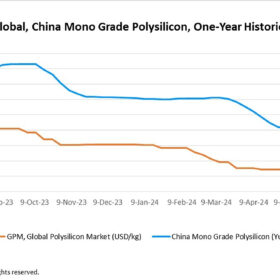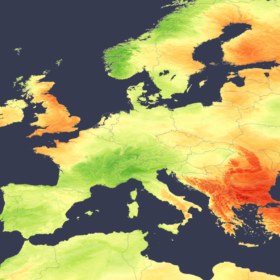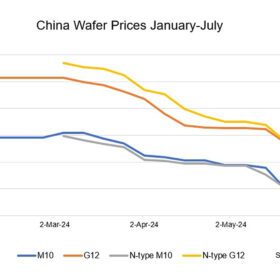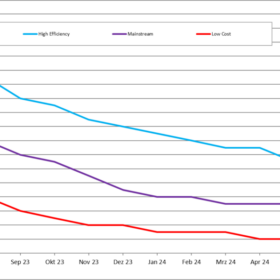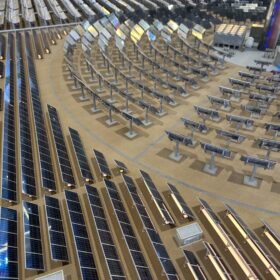Texas solar shines through Tropical Storm Beryl
In a new weekly update for pv magazine, Solcast, a DNV company, reports that the Tropical Storm Beryl caused a large but temporary dip in solar generation potential across Texas on July 8. However, cross-referencing with grid operator reports revealed that very little production went offline due to the storm, showing the resilience of Texas’ solar infrastructure.
Polysilicon prices stabilize at low levels amid market downturn
In a new weekly update for pv magazine, OPIS, a Dow Jones company, provides a quick look at the main price trends in the global PV industry.
‘Mobile work policies are extremely beneficial for women’
This week, Women in Solar Europe (WiSEu) gives voice to Olga Kovalchuk, Head of Finance and Investment – Managing Director at Germany’s Goldbeck Solar. She says that the underrepresentation of women in STEM subjects affects the pipeline of women entering both the renewable and traditional energy sectors, though this is gradually improving with more targeted educational initiatives. “The gender pay gap is ever-present and, given how much pay is linked to performance in senior positions, the underrepresentation has a knock-on effect on the gender pay gap for the industry,” she stated.
Weather standstill limits European solar production in June
In a new weekly update for pv magazine, Solcast, a DNV company, reports that, while in June Western Europe experienced below-average irradiance, Eastern Europe and the Balkans in particular saw a notable increase, resulting from persistent and static weather patterns.
Wafer prices stable-to-soft on weak demand
In a new weekly update for pv magazine, OPIS, a Dow Jones company, provides a quick look at the main price trends in the global PV industry.
PV market eyes recovery amid falling module prices
Martin Schachinger, founder of pvXchange.com, says that solar module prices are falling across the board, while batteries and inverters are hitting historically low prices due to market oversupply.
‘More women in hiring positions will ensure more women will be hired’
This week, Women in Solar Europe (WiSEu) gives voice to Annemarie Schouten, Head of Solar Development Netherlands at Vattenfall. She says establishing herself in a male-dominated sector was not always easy and explains how finding mentors may offer good support in dealing with unequal treatments. “I would say to younger colleagues entering this industry to surround themselves with different people,” she stated. “People that are not just like you. We need this variety of views, insights and ways of working to tackle the challenges ahead.”
New Mexico solar output drops amid heatwave-induced storms
In a new weekly update for pv magazine, Solcast, a DNV company, reports that summer weather and a heat dome have brought increased irradiance to both US coasts. As a result, much of the continental United States saw irradiance moderately above average, 5-10% above historical June averages, with the increase most notable along the East Coast.
China modules prices trend lower on weak demand, oversupply
In a new weekly update for pv magazine, OPIS, a Dow Jones company, provides a quick look at the main price trends in the global PV industry.
The many potentials of solar energy
In addition to producing renewable electricity, solar energy can also enable the clean production of hydrogen. Its potential in different applications is being assessed by several teams of researchers around the world. Adrian Pennington reports on some of this R and D and how IEC Standards can help in the third of the IEC columns for pv magazine

